![]()
FIRE
AT WELLINGTON STREET
21st January
1909
|
THE THREE RESCUED HORSES |
THE HOLE MADE TO RESCUE THE HORSES |
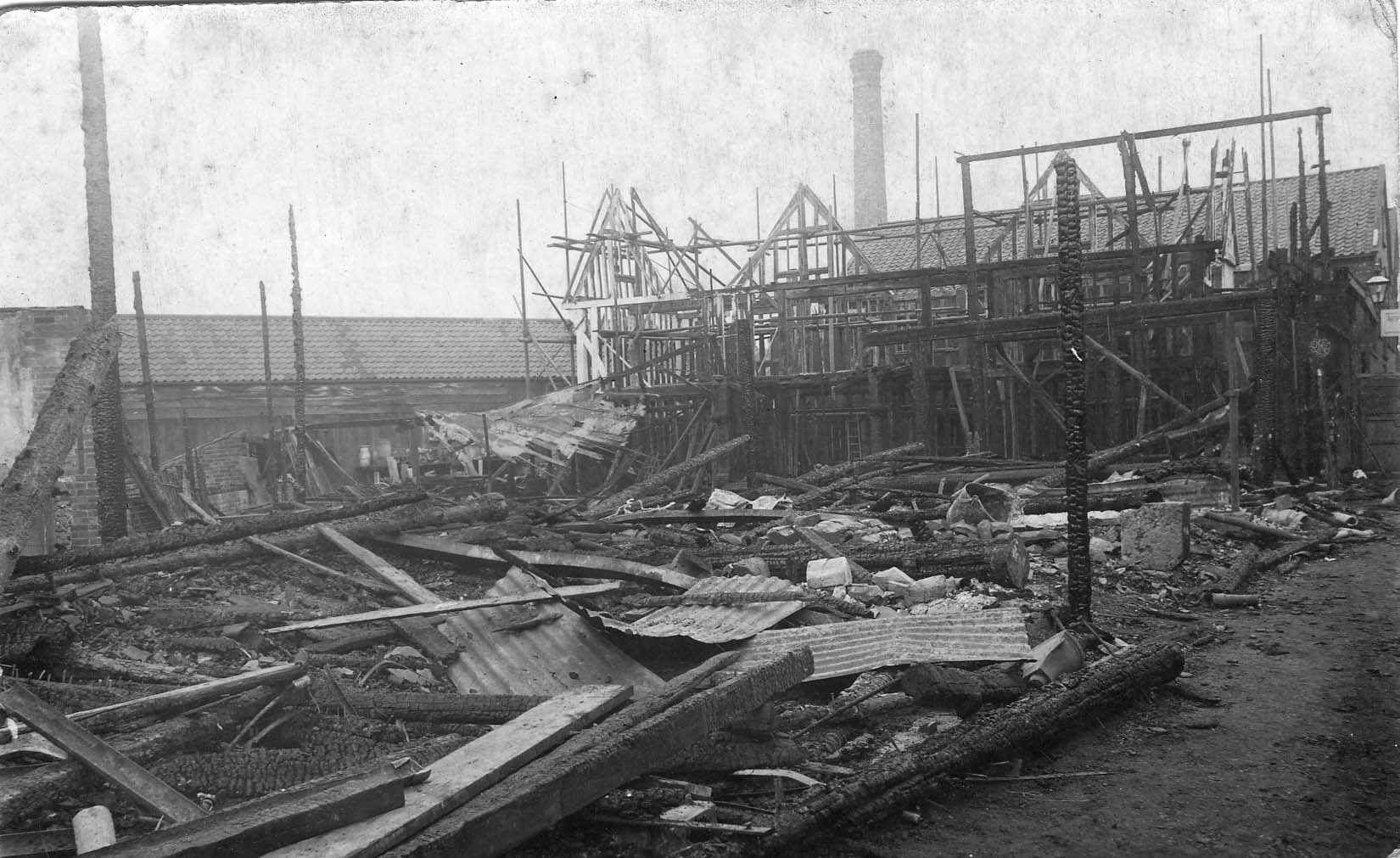 |
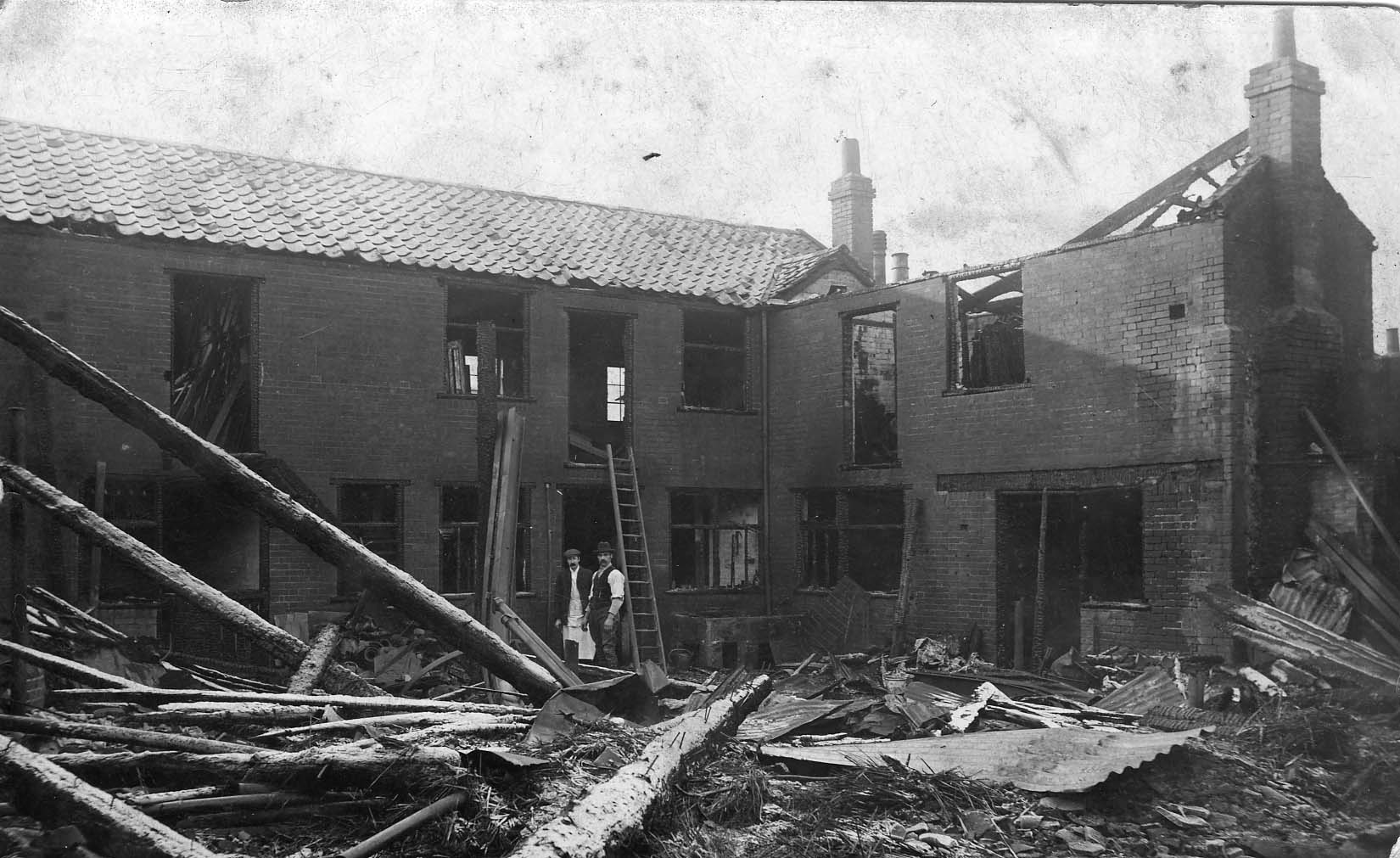 |
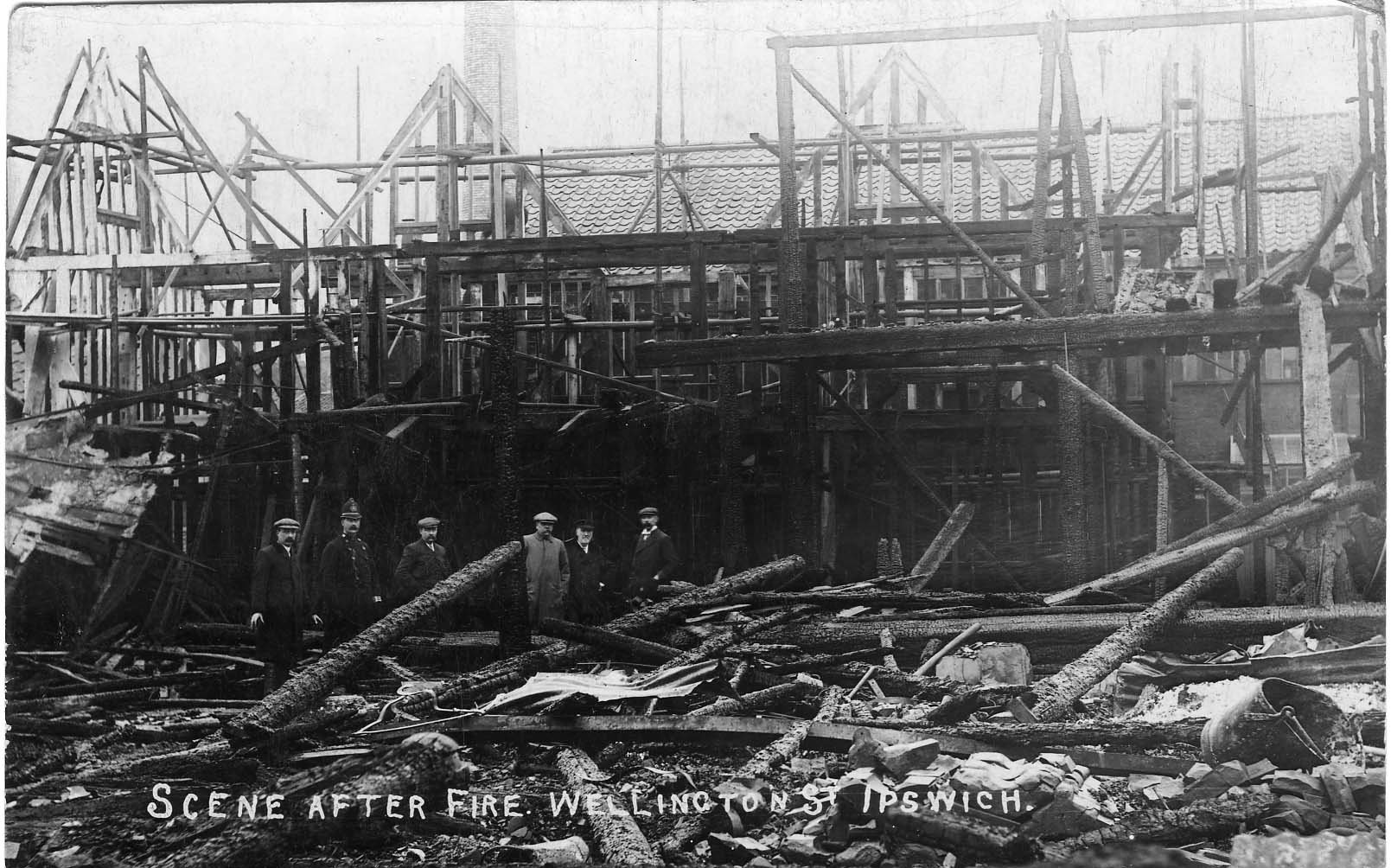 |
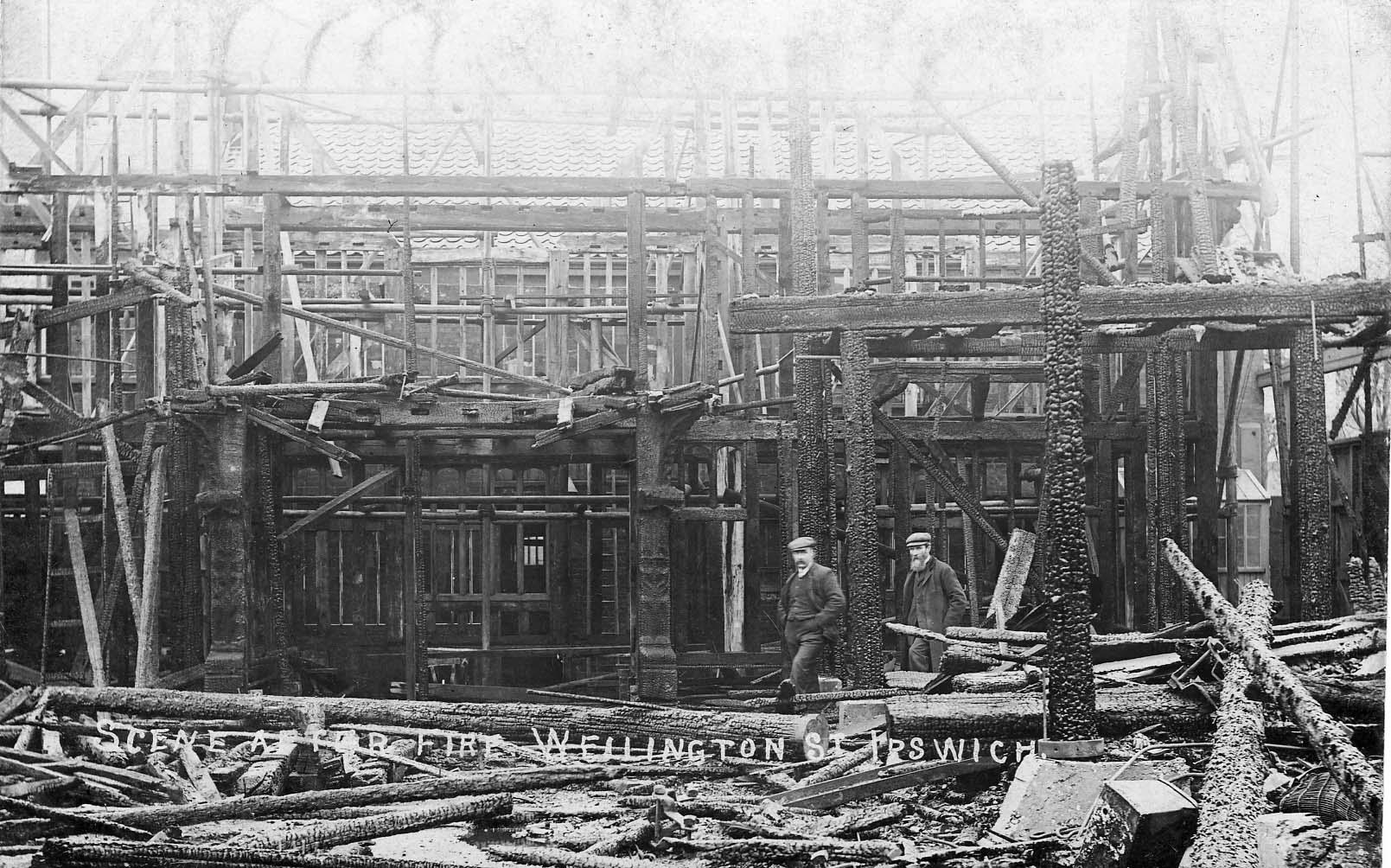 |
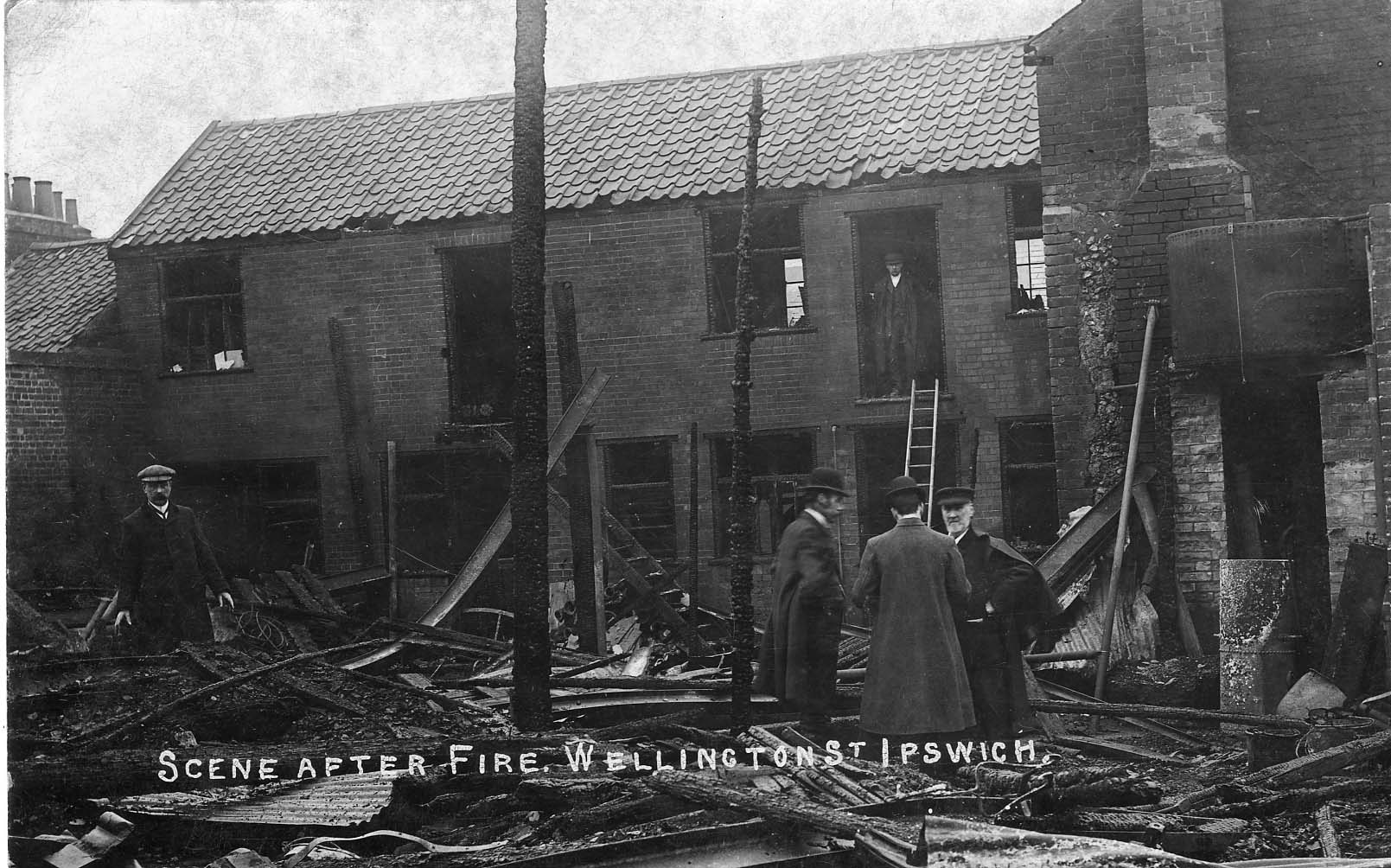 |
WAKING UP TO THE AFTERMATH |
Pictures from own collection
The story as covered by the Evening Star newspaper
EXICITING MIDNIGHT FIRE AT IPSWICH
_______
HORSES RESCUED BY BATTERING IN WALL
An outbreak of fire, which, owing to the sudden
and surprising reflection of the lurid glare in the atmosphere, caused great
alarm, occurred in the western district of Ipswich just after eleven o'clock
on Thursday night, and must have resulted in very considerable damage, of which
no details are yet available.
The scene of the outbreak was an area of about half an acre, or perhaps more,
between the Norwich Road, Wellington Street and Waterloo Street, the last-named
being a narrow lane with cottages on either side. With in this space, bounded
on all sides by houses and other buildings, but with a narrow roadway running
diagonally through it from Waterloo Street to Wellington Street, there was a
veritable sea of flame, leaping waves and tongues of fire spreading about in
all directions in a most alarming manner. The fire appears to have originated
in the yard or one of the numerous sheds, belonging to Mr Arthur Girling, the
builder, some of which are sub-let to other persons for various purposes. Mr
Marriott, builder, of London Road, rents a portion of them, and a Stable. Other
adjacent buildings where occupied by Mr Pendell, a carter etc. The store of
a rag and bone and marine store dealer named Page is also situated in the neighbourhood.
From this it will be seen that the character of the buildings and their contents
was highly inflammable, and this will account for thr astonishing rapidity with
which the flames spread.
It seems that Mr R A Calvesbert, who keeps a small shop at the corner of Waterloo
Street, noticed a smell like the burning of wood about half past ten o'clock,
and he went out in his back yard to look round his sheds. Not finding any trace
of fire in his immediate vicinity, he returned to the house and went to bed,
from which he was awakened half an hour later by the cry of 'Fire' ringing out
almost under his windows.
By this time the whole neighbourhood was in turmoil, and the excitement and
tremendous. By half past eleven o'clock the whole of the three-cornered area
above described was a seething mass of blazing timber, which threw off myriads
of sparks and immense clouds of golden smoke, which converted the scene into
a brilliant spectacle such as has seldom been surpassed in Ipswich on such terrible
occasions.
The fire brigade, as soon as the alarm was received, made all haste to the conflagration
with the steamer and manual, and all the available police appeared very smartly
from various directions with many of their officers, who
at once undertook the control of the ever increasing crowds and the direction
of the efforts of some of the many volunteers who assisted those inhabitants
of Waterloo Street whose effects were in danger.
Shortly before twelve o'clock, when the fire was at its height, it was realised
that all efforts to liberate by the ordinary means of access three horses belonging
to Mr Pennell, would be in vain, and a stalwart man named Alfred Vincent, of
14 Cardinal Street, set to work on a performance which redounds very greatly
to his credit, and in which he soon had many eager helpers. Procuring a pickaxe,
he set to work to dislodge the bricks of the back wall of the stable in Waterloo
Street, and with the help of W. Green of 87 Bulver Road, T. Markham, W.E. Baldwin,
J.W. Fuller, A.Andrews, R.Baxter and other, a gap in the stable wall soon appeared.
Then it was found that there was a huge beam right across the wall, and Markham
was very promptly at work with a saw, with which he cut through the beam. Other
woodwork had to be broken away before a clear way could be made for the horses,
and no sooner was the wall down than the lurid glare of the fire shone fiercely
through the gap, spurring the men on to do their utmost. Regardless of their
clothing or their skins, they battered away all obstructions until amidst cheers
from spectators, who had crowded into the lane, the first horse was brought
out. After a few minutes another appeared, and a little later the third and
last, and all round seemed mightily glad that the poor brutes has been so determinedly
rescued from the fate which threatened them.
All this while scenes scarcely less moving to the beholder had been going on.
On either side of the stable were cottages, eight or nine in number, and their
occupants quickly realised that the peril to them and their household goods
was very real, the raging flames a few yards away on the other side of six-foot
wall, men, women and children bundled out in terror, and then the older ones
went quickly to save their things. The neighbours and passers-by lent a willing
hand, and in a remarkably short time every cottage was stripped of its furniture,
many people somewhat foolishly in their panic throwing things out of the bedroom
windows. With their back window panes scorching hot and the paint on the doors
smoking and blistered, it was perhaps not surprising that they lost their heads.
The danger seemed so imminent was averted so far as the houses were concerned,
but the stable was partly burned.
Little can be said now as to the services of the Brigade in detail. When they
set to, they worked with a will, and appeared to work with fine effect, quickly
bringing about change in the scene. Confidence that the fire would not extend
began to be felt when the firemen had been at work for half an hour, and this
belief was shown to be well founded, for about a quarter to one o'clock the
flames were practically got under.